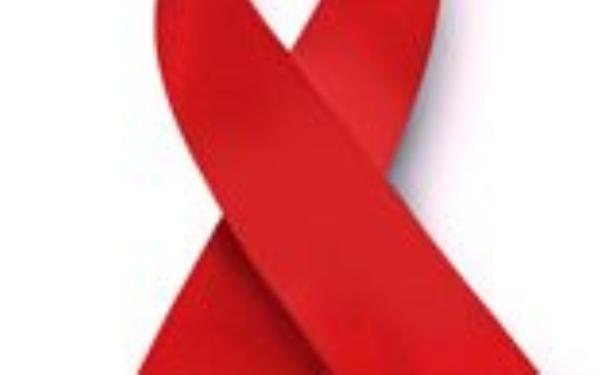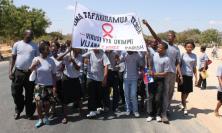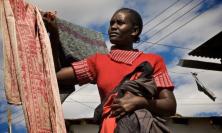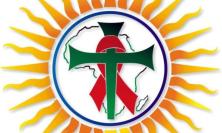On World AIDS Day, Ekeno Augostine SJ of the African Jesuit AIDS Network tells the story of Mama Huruma, a HIV positive woman from Tanzania. How has HIV/AIDS affected the lives of Mama Huruma and her children, and how can we respond to the demands that her situation places upon us as members of one human family?
I recently helped to facilitate a one-week workshop on HIV/AIDS and Media at Radio Kwizera in Ngara, Tanzania. We visited a support group for HIV positive women, and there we met Mama Huruma[1], a mother of six children from Ngara, who told us her story:
When my husband discovered that he was HIV positive, he abandoned us without a saying a word. I was married for many years and had six children with him. Our first-born child completed primary school in 2006 and he managed to join secondary school: at the moment he is in form three. I cannot bear the burden of seeing him through high school. In February this year, when I went for a medical examination, I tested HIV positive. I was asked if I was married; my answer was yes but my husband abandoned us in 2006, and we do not know where he is. Then the doctors asked for his name, as soon as I mentioned his name they said he was their client and that he had been to that hospital and was tested positive. When I left the hospital I headed home straight and gathered the whole family of my husband and told them my status. When I told them that I needed someone to accompany me to the hospital so that I can start taking ARVs [antiretroviral drugs] they all refused. The doctors told me that their refusal to support me will delay me from starting on ARVs. The doctors then advised me to even look for a willing neighbour to act as my guardian so that I can start off on the medication. I went back to the village and tried to request a neighbour who also declined. Finally when I requested my sister, she accepted and I was able to start the medication.
Since March this year when I started taking the ARVs I am pretty much healthier than before. However, what really disturbs me psychologically is the future of my children. The one in form three, I can no longer meet most of his school needs. My health has deteriorated. Another one has just completed primary school and waiting to join secondary school next year. Will I manage for the two of them? What am I going to do? And there are others in primary school. Really, what I am asking the state and well wishers is for them to think seriously about us who are living with HIV/AIDS and our children who are in schools. We cannot meet their needs and demands.
Mama Huruma’s testimony mirrors that of so many other women living with HIV/AIDS. HIV/AIDS has turned them into mere ‘objects’, devoid of their ability to bring about positive change; it has turned those who were once beacons of hope in their community into helpless beings, now relying on the mercy of the society around them. Mama Huruma’s context is Tanzania, but HIV/AIDS is not only a national or regional reality, but a global one. As an international community and a human family, we have a moral obligation to expand the capabilities of HIV positive women in our midst. I shall discuss how the Church, the State, and indeed all of us have a duty to Mama Huruma to listen to her story and try to help the many women in similar situations.
HIV/AIDS and agency
HIV/AIDS prevents women who live with the disease from being ‘agents’. The concept of an ‘agent’ here refers to a person as a dynamic subject with ‘participatory and self-determining capacities for living out one’s loves and desires’.[2] Amartya Sen, in his book, Development As Freedom, defines the term agency as the ability to bring about change. For Maria Cimperman, the agent is an opposition to a person as an object: she argues that perceiving a person as an ‘object’ removes from that person the ability to make decisions, but treating him or her as a ‘subject’ defines the self to be the starting point for discernment and decisions.[3] Women living with HIV/AIDS who have been denied the support structures that they may once have relied on have lost the capacity for self-determination.
Cimperman argues that agency is about the love of self, God, and the other, in a continually spiralling movement.[4] Because of HIV/AIDS, many people like Mama Huruma have lost love for themselves and for others, and consequently the power to stand firmly and fight for their rights. These women are bearing the brunt of HIV/AIDS in Africa. Whose responsibility is it to empower Mama Huruma and others in her predicament to live out their desires?
Church and HIV/AIDS: A call for personal and communal responsibility
Christians should be at the forefront of the fight against HIV/AIDS. They should be motivated by the urgent imperatives, passionately felt for the sake of showing Christ’s love of neighbour, to save lives, to work for reconciliation, and to see that justice is done for those who suffer as a result of the disease.[5]
We are called to treat every person as of infinite value. This invitation is not peculiar to Christians or believers but applies to all human beings: ‘all human beings are entitled to equality of rights, … irrespective of any condition … every vulnerable, marginalised, isolated group or section of community is entitled to special rights and to special emphasis of certain rights in order to be fully empowered in the fight against vulnerability, marginalisation and isolation.’[6]
The Churches can promote conditions – personal, cultural, and socio-economic – that empower people living with AIDS to make responsible choices.[7] The Church has responsibility for forming its people to be moral agents and in doing so the Church actualises its role as not only a healing community but also as an instrument of transforming the structures of sin that cause the spread of HIV/AIDS. In other words, the Church needs to actively participate in the ‘analysis of a cluster of inter-related factors. These include the theological and ethical perspectives that inform, or arise from, our understanding of AIDS; the effects of poverty on individuals and communities; issues of justice and human rights; the understandings of human relationships; and the understanding of human sexuality.’[8] Analysing the cluster of challenges posed by HIV/AIDS implies identifying with the powerless. The Church must go to the margins and reach out to the most affected.
As a human family, our need for one another is a constitutive dimension of our humanity. Our concern for others calls us to seek, for those who do not possess it, fully embodied relational agency. The Church’s role must be that of ‘an instrument for giving voice to the cry of the poor majority, who by their existence are trumpeting the proclamation that today one cannot be a human being and disregard the sufferings of millions of other human beings.’[9]
HIV/AIDS and human rights
Women living with HIV/AIDS generally encounter rejection, abandonment, isolation, stigmatisation, and often are denied basic rights (such as liberty, autonomy, security and freedom of movement) enjoyed by the rest of the population. The failure to denounce the denial of the social, cultural, and economic rights of people living with AIDS is to some extent due to the sheer lack of awareness and information about their own rights that people living with AIDS have. Like many other women in the developing world, Mama Huruma is not aware that her children have the right to education, or that she has the right to the highest attainable standard of physical and mental health. Instead, she is trying to voice her appeal to the government and other organisations to take pity on her and provide her with the basic necessities to survive. She does not know that she and her sons and daughters have a right to these necessities and should not need pity.
The Universal Declaration of Human Rights (UDHR) states that: ‘Everyone has the right to education … Education shall be directed to the full development of the human personality and to the strengthening of respect for human rights and fundamental freedoms ….’ This right obliges States to provide children and adults with HIV/AIDS formal education. They should not be denied education, including access to schools, universities, scholarships and international education simply because of their HIV status, or because they are incapable of meeting school financial requirements. Instead, governments should set aside some funds to purposely assist children from families living with HIV/AIDS. The State has the obligation to expand these children’s capabilities to be agents of change in future.
Global and local responses
Mama Huruma’s story issues a challenge to each one of us, a challenge that is similar to the one posed by Sharon Thornton in her book, Broken Yet Beloved. She argues that when we hear of someone hurting we must take it seriously. A hurting person invites us to hear the songs and voices hidden in the stones that cry out.[10] Mama Huruma is asking for some relief from her suffering – we are challenged to listen and respond.[11]
There is no doubt if we remove ourselves from the experiences of those affected and infected by HIV/AIDS, we will not understand the suffering and the devastation caused by the pandemic. We should be willing to ask ourselves how we can develop the will, knowledge, attitudes, values and skills required to empower those most affected or vulnerable to HIV/AIDS. What we are doing to help them?
It is high time for all of us in Africa and abroad to realise that HIV/AIDS is a threat to the common good. Health expenses lump financial constraints on governments and on families that are already struggling financially. The demands imposed by AIDS are complex and multidimensional, and there is need to adopt some form of radical solidarity in dealing with the issue; there is need for collaborative work, pooling resources together – physical, moral and spiritual – to deal with the crisis. The story of Mama Huruma and women like her, shunned and neglected by their loved ones, tortured by daily thoughts of how to raise school fees for their children and of how their ‘fatherless’ children are going to survive when they die, ‘calls for a radical ethic of care and compassion which enables those infected with the virus to live in hope and die with dignity.’[12]
What then as a human family should we do for Mama Huruma? There are many people who have not really developed an awareness of how HIV/AIDS is a problem to communities, countries, and the world. It is only when we develop such awareness that a communal concerted effort develops into a path towards solidarity. Only by asking and being concerned about what they are going through can we learn what must be done to alleviate the suffering of people living with AIDS. However, this form of identification with the powerless should seek not only to alleviate the immediate symptoms but also the root causes of the unjust distribution of what is needed for people living with AIDS to flourish. Therefore, there is need for a move from identification with the suffering to a practical response of correcting unjust structures.
The way forward
Women on the African continent have for years been relegated to subordination by a culture of silence. It is my hope for them that they can find the strength to be vocal in denouncing oppressive situations and to defend their fellow women who are bearing the brunt of cultural exploitation and domination, and to live as role models in society. Perhaps one way to strengthen the voice of women living with HIV/AIDS is by pressurising governments to nominate a woman who is HIV positive to be a member of parliament. It is important that HIV positive women are represented at all levels of social and political decision-making structures. In a study done in 2006 by UNICEF in the Eastern Africa region on girls, women and HIV/AIDS, the issue of equal representation of women in decision-making processes came out explicitly as a great need. The study showed that participation of women in decision-making processes would ensure and facilitate the incorporation of women’s issues and interests in policy and programming. This study affirmed that it is ‘a matter of natural justice and democracy that women take part in processes deliberating on the human goals of equality, development and peace.’[13] Such representation will ensure that adequate attention is paid to HIV/AIDS and its impact on women and children. In fact, such a representation will give hope and agency to those women who now live without both.
Mama Huruma needs to be empowered economically, socially, and politically. She needs protection by the law because she is denied, by her own cultural set up, the freedom to own property or access financial resources. Many women in the developing world are dependent on men for their survival. This means therefore, that when their men abandon them because of their HIV status, they and their children are left at the mercy of well-wishers. To empower these women means not only establishing laws to deal with these and other forms of oppression, but more importantly setting up programmes in all other development areas. Issues of equality and autonomy need to be addressed, to encourage girls and women to be independent, and that must be extended to the political arena and every aspect of life.
Ekeno Augostine SJ is a Regent at the African Jesuit AIDS Network, Nairobi, Kenya.
[1] Name has been changed.
[2] Maria Cimperman. When God’s People Have HIV/AIDS: An Approach to Ethics. New York: Orbis Books, 2005, p. 35.
[3]Maria Cimperman. When God’s People Have HIV/AIDS, p. 35.
[4] Maria Cimperman. When God’s People Have HIV/AIDS, p. 36.
[5] Facing AIDS: The Challenge, the Churches’ Response. A World Council of Churches (WCC) Study Document. Geneva: WCC Publications, 1997, p 103.
[6] John Mary Waligo. Respect and Defence of the Human Rights and Freedoms of Persons Infected and Affected by HIV/AIDS: The Challenge to Society. Occasional Paper No. 2 On HIV/AIDS. National Catholic Commission for Justice and Peace (NCCJP) Nsambya – Kampala. March 2005. P 1.
[7] Ibid p 103
[8] Ibid p 106.
[9]Maria Cimperman, When God’s People Have HIV/AIDS, p. 80.
[10] Sharon, Thornton. G. Broken Yet Beloved. St. Louis: Chalice Press, 2002, p. 64-65.
[11] Evelyn Wakhusama, ‘Abused and Infected with HIV: A Call for a Communal Response’, Women, Religion and HIV/AIDS in Africa: Responding to Ethical and Theological Challenges. Ed. Teresia M. Hinga et al. South Africa: Cluster Publications, 2008, p. 177-178.
[12] Teresia Mbari Hinga, ‘AIDS, Religion & Women in Africa: Theo-Ethical Challenges & Imperatives’, Women, Religion and HIV/AIDS in Africa: Responding to Ethical and Theological Challenges. Ed. Teresia M. Hinga et al. South Africa: Cluster Publications, 2008. p. 99.
[13] UNICEF. Girls, Women and HIV/AIDS in Eastern Africa. Study done by Dr. Alice Akunga. 2006. p. 31.






